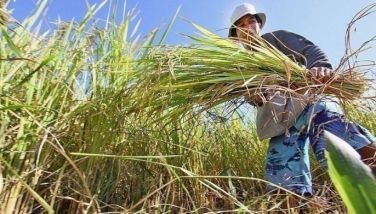DA favors imposition of regional SRP on food
MANILA, Philippines - The Department of Agriculture is looking at regionalizing the suggested retail price (SRP) for agricultural products to prevent supply and pricing disruption in the event of natural calamities.
This is in line with the fresh round of consultations to be held for the implementing rules and regulations (IRR) of the amended Price Act of 1992.
The DA announced Tuesday it suspended the application of the IRR of the Price Act on agricultural commodities to give way to wider consultations among traders who fear the price control provisions of the law.
The IRR covers basic necessities identified as rice, corn, root crops, fresh and dried fish and other marine products, fresh pork, beef and poultry meat, fresh eggs, fresh milk, fresh vegetables, fresh fruits, sugar, and cooking oil.
It also covers prime commodities identified as dried pork, dried beef and poultry meat, fresh dairy products not falling under basic necessities, onions, garlic, fertilizers, pesticides, herbicides, poultry, livestock and fishery feeds, and veterinary products.
“There are many groups seeking clarification on the IRR so instead of implementing the IRR with questions, we deemed it necessary to call for another round of consultations that would be conducted nationwide,” Agriculture Secretary Proceso Alcala told reporters on the sidelines of the opening of the 37th Meeting of the ASEAN Ministers of Agriculture and Forestry in Makati.
The IRR as applied to agricultural products is meant to ensure the availability of basic necessities and prime commodities at all times without denying businesses of profit. At the same time, it aims to stomp out profiteering.
Among the provisions considered to be contentious by traders is the imposition of the SRP and penalties for profiteering.
Under the proposed IRR, the Agriculture Secretary, upon the recommendation of the multi-agency Bantay Presyo Technical Committee, may issue SRPs that shall be in effect for no longer than 60 days unless extended or lifted.
Businessmen found to be selling agricultural products at prices exceeding the SRP by more than 10 percent shall be considered profiteering.
Offenders shall be called upon to explain their actions.
Traders consider these provisions as a form of price control although the department was quick to point out that the SRP is meant to serve as a guide and not a form of price control.
Agriculture Assistant Secretary for Agribusiness and Marketing Leandro Gazmin said making SRPs regional would provide greater protection against pricing and supply disruptions in the event of calamities.
“Before, when we put up an SRP, we do it on a national level. It is more difficult to do that for agricultural products because the pricing depends on the origin of the products,” he said.
“So, when prices are high in Metro Manila, we peg an SRP that is sometimes much higher than that in other regions. As a result, regional prices rise because they are basing the prices on the national SRP,” Gazmin added.
He also noted that the President would impose a price freeze in areas declared under a state of calamity. Traders therefore tend to shun these areas to post higher earnings.
In these situations, the Bantay Presyo Committee would step in with recommendations on where SRPs would be declared.
Gazmin said the second round of consultations for the IRR would be conducted within the year.?
“We are still preparing the timeline but definitely the consultation would take place within the year,” he said.
Gazmin said once the IRR is finalized, the DA regional offices could begin creating the Bantay Presyo Committee.
- Latest



























